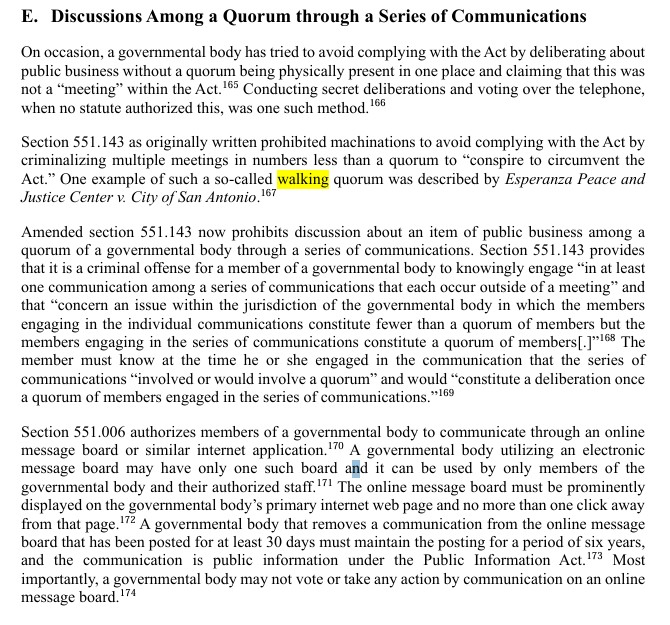When we dropped Part 1 about John Keating’s not-so-secret bid for Mayor, the inbox lit up like a Christmas tree in July. “Finally!” people said. “Someone’s talking about it!” Well, after a little digging, a little late-night reading of Texas law (because apparently someone has to), we have a few follow-up questions that deserve a big, neon spotlight:
Did our council members just break the law?
Let’s talk about the dreaded “Walking Quorum.” According to the Texas Open Meetings Act (TOMA), Section E, a quorum isn’t just when everyone’s packed into City Hall pretending to listen. Nope. TOMA makes it crystal clear that you can’t have a series of backroom, back-to-back, whisper-to-whisper communications about city business that add up to a quorum. Doesn’t matter if it’s by text, email, smoke signals, or gossip in the golf cart.

Section 551.143 spells it out: if you, as a public official, knowingly join even one of those off-the-books conversations, and the chain adds up to a quorum discussing city business? Congratulations—you’ve just committed a criminal offense.
ALL COUNCIL DECISIONS (LIKE MPT / DMPT) HAVE TO BE POSTED AND DISCUSSED IN PUBLIC. To be honest, I am not even sure if it is allowed in executive session – we are researching that further! Maybe the city puts it on the agenda under “Employee Deliberations” and the slip in the conversation that they should be having openly in the council meeting for the public to see. Who knows!

Have you ever wondered why when the council comes out of “Closed Executive Session” which seems to take a long time now how they never have any discussions on some key decisions. There was hardly any talk on the Dias about MPT/DMPT – they just went to a vote. Why? Because they had already discussed it! We believe our city council could be using “Executive Session” to hide important conversations that should be PUBLIC. It needs to be investigated by the authorities because right now it looks bad, very bad!
Now, what does that mean in real life?
- Official #1 chats with Official #2.
- Official #2 slips it over to Official #3.
Boom. Illegal. That’s how the law reads.
And here in Frisco? We’ve got text messages. We’ve got John Keating saying he’ll “talk to Angelia.” Funny thing: we never saw those texts. Where’s the paper trail? Did they hop on a quick phone call instead? Did someone “forget” to turn over their emails?
Then we have Keating chatting up Laura Rummel about votes for Mayor Pro Tem and Deputy Mayor Pro Tem. We know this because Rummel submitted her text message in response to the PIR Request.

Question 1: Why didn’t John Keating turn over a copy of the communication with Laura Rummel. It clearly meets the PIR request. Laura Rummel turned it in!
Question 2: Where are the conversations between Keating and Pelham? Clearly, they were talking about Mayor Pro Tem and Deputy Mayor Pro Tem but neither of them turned in any copies of their messages or emails.
Now add Livingston to the mix, and suddenly we’re not playing with hypotheticals anymore—we’re at four. Livingston, Keating, Pelham, and Rummel. Keating led the charge, talking to Angelia and Rummel, and told Livingston he would talk to them. So, it was clear conversations were happening with Keating being the one bouncing around to the other three. That’s a quorum, folks.
And according to TOMA, that’s not just bad optics—it’s a violation.
Which leads us to a very simple question: How can someone who wants to run for Mayor not know the rules of the Texas Open Meetings Act? And honestly, how can any of them sit on the council and not know this?
If you’re going to lead Frisco, maybe start with knowing what you legally can and can’t do. Just a thought. But hey, we’re just the ones asking the questions.
Hopefully someone reading this knows the Texas Attorney General or Collin County DA because it should be investigated. Stay tuned—because something tells us this story is only starting to unravel.
Link: Texas Open Meeting Act (TOMA)
Disclaimer: This blog includes satire, parody, and comic relief. It contains summarized accounts created solely for humor and commentary. Any resemblance to real events is either coincidental or intentionally satirical. Reader discretion — and a sense of humor — are advised.
0 Comments